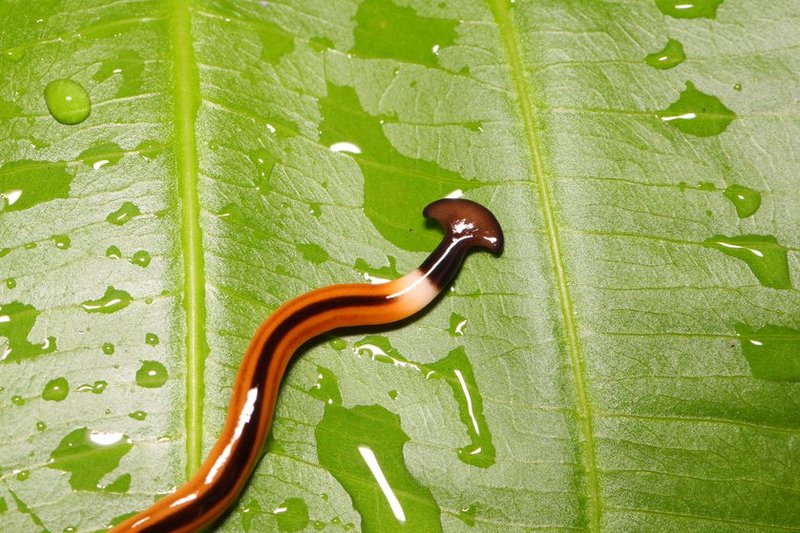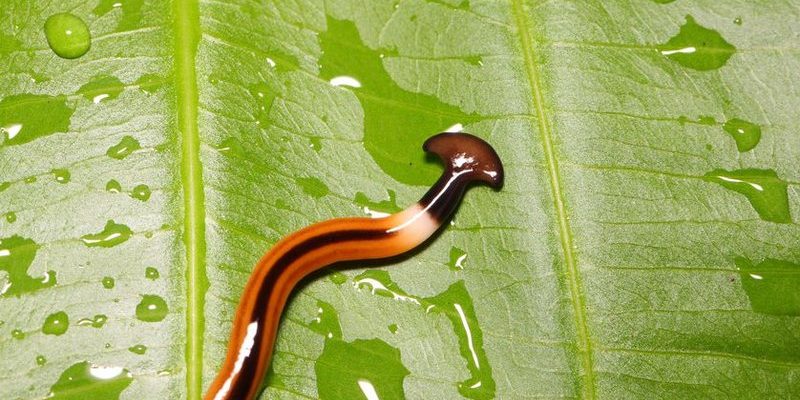
Imagine diving into a world where every little organism plays a role in maintaining the balance of your garden. Some act like tiny superheroes, helping plants thrive, while others might just be troublemakers. Hammerhead worms fall into that latter category for many gardeners, but it’s essential to understand who they are, what they do, and how they impact soil health. Let’s explore the fascinating world of hammerhead worms.
What Are Hammerhead Worms?
Hammerhead worms, scientifically known as *Bipalium spp.*, are fascinating creatures that belong to the phylum Platyhelminthes, which includes flatworms. Their most striking feature is their broad, flattened, hammer-like head, giving them a unique appearance. Typically found in tropical and subtropical regions, these worms can range from a few inches to over a foot long! You might spot them crawling on moist surfaces, often after rain.
Now, here’s the intriguing part: hammerhead worms are predators. That’s right! They primarily hunt and feed on earthworms, which are vital for soil health. By consuming these beneficial worms, hammerhead worms can disrupt the delicate balance in the ecosystem. If you’ve ever tried to grow a garden, you know that having plenty of earthworms is crucial for aerating the soil and helping plants absorb nutrients.
How Do Hammerhead Worms Impact Soil Health?
Let’s think about your garden as a community. Just like people, every organism contributes to the overall health and functionality of that community. Hammerhead worms can be likened to uninvited guests at a party who, instead of mingling, consume all the snacks. When these worms invade, they primarily feast on earthworms, which disrupts the natural soil structure.
Earthworms are often called “nature’s plow” because they aerate the soil and help decompose organic matter. When hammerhead worms take out these essential players, the soil may become compacted, making it difficult for roots to grow and absorb vital nutrients and water. If your garden starts to look tired or plants begin to struggle, it might be worth checking for the presence of these flatworms.
The Good and the Bad of Hammerhead Worms
Like many creatures, hammerhead worms have a double-edged sword. On one hand, they play a role in controlling certain pest populations. However, considering the harm they inflict on earthworms and the soil ecosystem, many gardeners see them as more harmful than beneficial. Here’s a breakdown:
- Good: Potential pest control for certain insects.
- Bad: They harm earthworm populations, leading to poorer soil health.
In summary, while they do have some ecological roles, you might find that their negative impact on more beneficial organisms outweighs the positives, especially in a home garden setting.
Identifying Hammerhead Worms in Your Garden
So, how do you know whether these mysterious critters are invading your space? Hammerhead worms stand out with their flattened bodies and unique shape. They typically exhibit a glossy, dark brown or grayish coloration, often with lighter stripes running along their sides.
If you’re out gardening and spot something that looks like a large, squishy pancake with a hammer head, chances are you’ve found a hammerhead worm. They tend to be most active at night or following rain and can sometimes be seen basking in the sun during the day.
Here’s what you should keep in mind:
- Look for their characteristic shape.
- Check for glossy coloration and stripes.
- Pay attention to their activity pattern, mainly at dusk or after rain.
Recognizing these creatures early can help you manage their population before they start impacting your soil health.
Are Hammerhead Worms Harmful to Humans and Pets?
You might be wondering if these worms pose any threat to you or your pets. The good news is, hammerhead worms are not usually harmful to humans. They do contain toxins that can deter potential predators, which means that some animals might think twice before munching on them. However, if you handle them, it’s best to wash your hands afterward, just to be safe.
For pets, particularly dogs and cats, ingestion of hammerhead worms might lead to minor gastrointestinal distress. Although it’s rare, it’s a good idea to keep an eye on what your furry friends are digging up in the yard. If your pet seems to be acting unusually after eating something it shouldn’t, a quick trip to the vet can help ease your mind.
Managing Hammerhead Worm Populations
If hammerhead worms have set up shop in your garden, you might be wondering how to deal with them. Here are some strategies to consider:
1. **Hand Removal**: Yes, it sounds simple, but you can pick them up using gloves and drop them into soapy water, which will humanely kill them. Just make sure to check your garden regularly.
2. **Barrier Methods**: Creating physical barriers can help deter them from entering your garden. For example, copper tape can be effective as they dislike crossing it.
3. **Diversity in Planting**: A diverse plant community can attract a variety of creatures that help combat hammerhead worms. Think ladybugs or other beneficial insects that can help restore balance.
4. **Moisture Management**: Hammerhead worms prefer damp environments. By managing soil moisture levels and improving drainage, you can create less hospitable conditions for them.
By adopting these practices, you can reduce their numbers and protect your garden’s health.
In the grand scheme of things in your garden, hammerhead worms stand as a reminder of the delicate balance of nature. While they might play a minor role in controlling some pests, their negative impact on beneficial earthworm populations and soil health often overshadows their benefits.
Keeping a close eye on these unusual creatures can help you maintain a thriving garden ecosystem. With the right management techniques, you can ensure that your soil stays healthy and productive, allowing your plants to flourish. Remember, your garden thrives when every member of its ecosystem works in harmony—so be sure to keep those hammerhead worms in check!

